9/22/2006, 2:40 pm
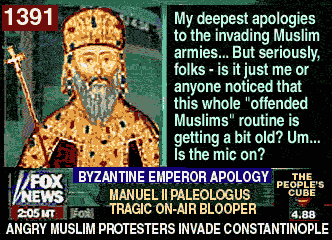
In a public speech made shortly after the quote first appeared in Muslim press, Manuel II apologized to the Islamic community that besieged his controversial "Byzantine entity," the term used to describe the Greek-speaking Roman Empire of the Middle Ages, centered at its capital in Constantinople (now Istanbul).
Muslim clerics respond:
 Muqtada Al-Sadr:
Muqtada Al-Sadr:Three words: Reason my donkey!
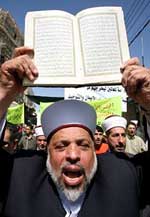 Performing Arts trainer and religious scholar:
Performing Arts trainer and religious scholar:To say that God cannot act irrationally is an insult to every irrational Muslim on earth and a blatant attempt to stifle unreasonable criticism.
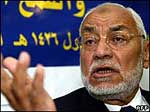 Mohammed Mahdi Akef, Muslim Brotherhood of Egypt:
Mohammed Mahdi Akef, Muslim Brotherhood of Egypt:It was very unreasonable of this infidel dog to expect a reasonable dialogue with a real Islamic scholar like me. Do you see the irony?
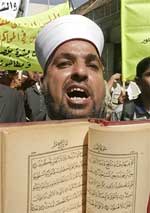 Spokesperson for "United Mosques For Peace & Uniformity":
Spokesperson for "United Mosques For Peace & Uniformity":I would like to find that "Islamic scholar" with whom he was debating and rape his entire family while having his body eaten by dogs in the same room.

"In my seventh dialogue with an imaginary Islamic scholar," the learned Byzantine ruler continued as he evaded occasional critical arrows flying from the surrounding hordes, "I referred to the Koran's teachings about spreading the faith by the sword. And this, I said, could not come from God because violence is the opposite of reason, and God himself cannot act contrary to reason. But your passionate criticism has proven to me that there is, indeed, nothing evil or inhuman in spreading the faith by violent means, and that beheadings of non-believers and terrorizing communities in the name of religion are all signs of perfectly rational behavior and wonderful mental health."
"Taking quotes out of context is similarly a magnificent example of a reasonable dialogue from which we all should learn," Manuel II said, adding that the recent slaughters of thousands of his Christian subjects by the Muslim sword were the result of his own blindness to the true peaceful nature of Islam.
"We can only hope that their sacrifice will help build real fraternity among us," he said, "so that all Muslims and Christians can learn to live with reciprocal respect of everyone's religious convictions, and that some 600 years from now conflicts and misunderstandings like this would be a thing of the past."
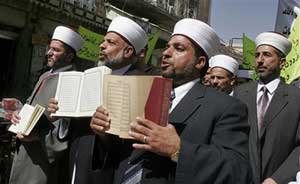
A group of Muslim scholars demonstrate passages in the Koran showing that the "Byzantine entity" has no right to exist.
But many Muslims perceived the Emperor's emphasis on "rational" as unhelpful. Demonstrations, threats and calls to violence continued throughout the Muslim world, as protesters demanded that the Byzantine ruler be punished by strict Islamic Shariah law for implying that Muslims cannot respond to criticism rationally, but only with demonstrations, threats and violence.
Angry Ottoman activists burned a number of ancient Greek churches and publicly beheaded residents in several Byzantine towns, converting the less stubborn survivors to Islam to the cheers and applause of prominent Muslim clerics who gathered for the occasion.
European leaders, who had recently declined Manuel's personal pleas for help against the invading Muslim armies, responded to the controversy by warning the Byzantine ruler about the danger of confusing Islam with a militant movement that masks itself as religion.
"We must avoid everything that increases tension between people or religions," said the King of France in an open letter to Manuel II (cc the Ottoman Court). "Islam is a religion of peace, and there is a need to be on constant alert against marginal provocations that are meant to turn this issue into a global crisis.
"In conclusion, it should be noted that the "Byzantine entity" lasted for only 62 more years, falling to the Ottoman Turks in 1453, thus ending the 1100-year-old controversy about its right to exist next to Muslim lands. Its capital Constantinople was renamed into Istanbul, its churches were converted to mosques, the country changed its name to Turkey, and its residents lost their language, cultural identity, and religion to Muslim Turks.
No wonder that today some of the strongest criticism of the Pope's use of the Byzantine quote is coming from Turkey - whose people suffered the most from bigoted remarks of the erstwhile Byzantine ruler.
Watch our video that puts old Manuel's quote back into its original context.
https://www.youtube.com/watch?v=MgiFvmGRdDQ
